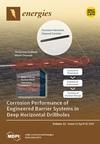Sizing Methodology of Dynamic Wireless Charging Infrastructures for Electric Vehicles in Highways: An Italian Case Study
IF 3
4区 工程技术
Q3 ENERGY & FUELS
引用次数: 0
Abstract
The necessity of pushing the road mobility towards more sustainable solutions has become of undeniable importance in last years. For this reason, both research and industry are constantly investigating new technologies able to make the usage of battery electric vehicles(BEV) as accessible and usable as traditional internal combustion engine vehicles (ICEV). One of the most limiting issues concerns the short range of electric vehicles, which complicates their use for long distances, such as for highway travels. A promising solution seems to be the “charge-while-driving” approach, by exploiting the inductive dynamic wireless power transfer (DWPT) technology. Nevertheless, such systems show different issues, first of all, high investment and maintenance costs. Furthermore, it is not clear how extensive a potential dynamic wireless charging infrastructure needs to be to make a real advantage for electric vehicle drivers. As a consequence, the aim of this paper is to introduce a new methodology to estimate the number and length of wireless charging sections necessary to allow the maximum number of electric vehicles to travel a specific highway without the need to stop for a recharge at a service area. Specifically, the methodology is based on a algorithm that, starting by real traffic data, simulates vehicle flows and defines the basic layout of the wireless charging infrastructure. This simulator can provide a decision support tool for highway road operators.高速公路电动汽车动态无线充电基础设施的规模确定方法:意大利案例研究
近年来,推动道路交通朝着更可持续的方向发展的必要性已成为不争的事实。因此,研究人员和工业界都在不断研究新技术,使电池电动汽车(BEV)的使用与传统内燃机汽车(ICEV)一样方便和实用。其中一个最棘手的问题是电动汽车的续航能力较短,这使其在长途旅行(如高速公路旅行)中的使用变得复杂。通过利用感应式动态无线电力传输(DWPT)技术,"边驾驶边充电 "似乎是一个很有前景的解决方案。不过,这种系统也存在不同的问题,首先是投资和维护成本较高。此外,目前还不清楚动态无线充电基础设施需要有多大范围才能为电动汽车驾驶员带来真正的优势。因此,本文旨在引入一种新方法,估算出必要的无线充电路段的数量和长度,以允许最大数量的电动汽车在特定高速公路上行驶,而无需在服务区停车充电。具体来说,该方法基于一种算法,该算法以真实交通数据为起点,模拟车辆流量并定义无线充电基础设施的基本布局。该模拟器可为公路运营商提供决策支持工具。
本文章由计算机程序翻译,如有差异,请以英文原文为准。
求助全文
约1分钟内获得全文
求助全文
来源期刊

Energies
ENERGY & FUELS-
CiteScore
6.20
自引率
21.90%
发文量
8045
审稿时长
1.9 months
期刊介绍:
Energies (ISSN 1996-1073) is an open access journal of related scientific research, technology development and policy and management studies. It publishes reviews, regular research papers, and communications. Our aim is to encourage scientists to publish their experimental and theoretical results in as much detail as possible. There is no restriction on the length of the papers. The full experimental details must be provided so that the results can be reproduced.
 求助内容:
求助内容: 应助结果提醒方式:
应助结果提醒方式:


